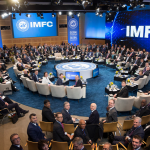GH: The IMF recently announced in its half-yearly global financial stability report that the world is approaching another financial crisis. Anoop Singh, the Gateway House Distinguished Fellow in Geoeconomics Studies, and the former Director of the Asia Pacific and Western Hemisphere Department at the IMF, explains the reasons behind the IMF warning.
You can listen to the audio interview here.
Virpratap Vikram Singh (GH): The IMF has announced that the world may head into another financial crisis. What are some of the more pressing global factors that have lead to this?
Anoop Singh (AS): This is a reaction to the greater turbulence we have seen in financial markets for the past six months—especially earlier this year, when markets reacted sharply to concerns about global economic growth risks, especially from China. Since then, some of the economic news has improved, especially about China. And there is a sense that the U.S Fed will now be more cautious in raising interest rates.
Financial market volatility has been at the forefront of concerns the last six months, and the negative reactions were sharper than justified by fundamentals.
The IMF is calling for global action because economic risks remain. and important structural actions need to be taken so that the turbulence in markets do not start again.
the IMF is now saying is that G20 countries need to act strongly and consistently on monetary policy, on fiscal policy, and most importantly on structural reforms to deal with the growth and financial risks.
GH: There is an economic slowdown in emerging markets, especially countries like Brazil and China. So what you’re putting forward is that it’s more of a warning but the signs do seem to be there.
AS: Yes emerging markets have been a source of concern for several years, not just the past few months. Underlying or potential growth in emerging markets has been falling almost every year. The main concern today is from China, given the vast spill overs from its global role.
But the concerns on China are overdone, given the rising consensus that China will grow around 6.5%. China’s economy is adjusting to greater reliance on domestic factors—domestic consumption and services, and a dip in China’s growth is understandable.
Overall, the concern with emerging markets is that their productivity growth has gone down, and the spill over concerns from China are significantly affecting commodity prices and markets. So, emerging markets need to deliver higher productivity looking ahead.
GH: What are some of the structural reforms that India can implement to safeguard itself against- against any future financial dangers?
AS: On India, we should take a positive approach, India has a growth rate of well over 7%–this is high given the global context.. With growth at this level, we don’t need additional fiscal stimulus and must persist with the planned fiscal consolidation.
What India needs more investment, not only from the public sector, but more from the private sector, which means that the crowding-out of the private sector that has been a factor in India for many years needs to be reduced. This is why the fiscal stance in the Budget was to maintain the projected consolidation in the fiscal accounts – especially important given the concerns that capital is beginning to move out of emerging markets.
This has particular effects for the debt of the corporate sector and for banks in many emerging markets, and certainly in India and China. So important structural reforms are needed to address corporate indebtedness, restructure bank balance sheets, recapitalize banks and make sure that banks are able to finance growth.
GH: Raghuram Rajan, the RBI Governor of India has suggested that bodies like the IMF need to undergo reform in order to address the needs of the global markets. What are some of the structural changes that the IMF can implement in order to make better prepare itself for a potential financial crisis?
AS: the IMF certainly has the resources to be more of a lender of last resort as needed for countries facing financial difficulties Beyond that, the IMF needs to be more effective in its surveillance activity and that is why it is making the call today for greater global policy action to ensure that the risks ahead are addressed.
Governor Rajan’s point that there is differentiation between the monetary policy of advanced countries and that there’ needs to be an institution that can look at the international spill over effects of national monetary policies, is an important one. In the years ahead, the IMF has to play more of a a global central bank role. The world needs such an institution and probably the IMF is the best equipped to be that institution. This will require a consensus on the constitution of the IMF. That will take time to happen.
You can listen to the audio interview here.
This interview was exclusively conducted for Gateway House: Indian Council on Global Relations. You can read more exclusive content here.
For interview requests with the author, or for permission to republish, please contact outreach@gatewayhouse.in.
© Copyright 2016 Gateway House: Indian Council on Global Relations. All rights reserved. Any unauthorized copying or reproduction is strictly prohibited.


